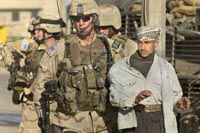Two Kurds die in clashes in southeastern Turkey
Two Kurdish protesters died in a hospital after being injured during last week's clashes between rioters and Turkish security forces, including one elderly protester who died of head injuries from a beating, hospital officials said Monday. The deaths raised to 15 the number of people killed as a result of Kurdish violence across the country.

Late Sunday night, three people were killed after a group of men tossed gasoline bombs at an Istanbul city bus, leading the driver to reverse his flaming vehicle onto a sidewalk and run over a group of people. Police said they suspect Kurdish militants were behind the attack and private NTV said men gathered around after the attack and shouted slogans for the outlawed Kurdish separatist group, the Kurdistan Workers Party, or PKK.
The clashes have been the worst street fighting in a decade and Turkish and Kurdish politicians have been urging calm. "These are the moments when Turks most need the Kurds and the Kurds most need the Turks," said Osman Baydemir, the mayor of Diyarbakir, the largest city in southeastern Turkey and one of the most influential voices in the Turkish-Kurdish community. "All should act with common sense and try to understand each other."
But he also warned that tensions could escalate if measures were not taken. "I have two deep concerns: the clashes could deepen and ... the willingness of Turks and Kurds to live together could be damaged," he said in an exclusive interview with The Associated Press.
Halit Sogut, 78, died after receiving blows to the head, hospital officials said, but would give no further details on the circumstances of his death. Sogut, and Emrah Fidan, 19, were fatally wounded early last week during mass demonstrations in Diyarbakir, hospital officials said. The governor's office said a total of nine people have been killed since the rioting began last Tuesday in Diyarbakir.
The clashes have mostly been concentrated in southeastern Turkey, the country's poorest region. The area is overwhelmingly Kurdish and Kurds have long claimed discrimination and demanded increased cultural rights.
Speaking Kurdish was illegal in Turkey until 1991. The government has increased some cultural rights at the prodding of the European Union limited television broadcasts were recently approved but many Kurds say the steps are too small. "This is a social blowout, it is the result of years of neglect of the problems of the Kurds," Hasip Kaplan, deputy chairman of the pro-Kurdish Democratic Society Party said in an interview Sunday night. Kaplan was in Diyarbakir as part of a Kurdish delegation that was urging calm.
The frustrations are especially intense in the shantytowns that ring Diyarbakir and are home to hundreds of thousands of Kurds who fled or were forced out of the countryside after fighting began between the PKK and the Turkish army. Some 37,000 people were killed as a result of the conflict and huge swaths of the countryside were depopulated.
Veysi Caglar, a street vendor selling fruits in Diyarbakir, said his family migrated to Diyarbakir after the military evacuated his village in nearby Bingol province. "We had a life there, a house, animals and everything," Caglar said. "We have nothing here but misery." The violence began after the funerals of four PKK guerrillas sparked a mass demonstration in support of the group, reports the AP.
N.U.
Subscribe to Pravda.Ru Telegram channel, Facebook, RSS!




